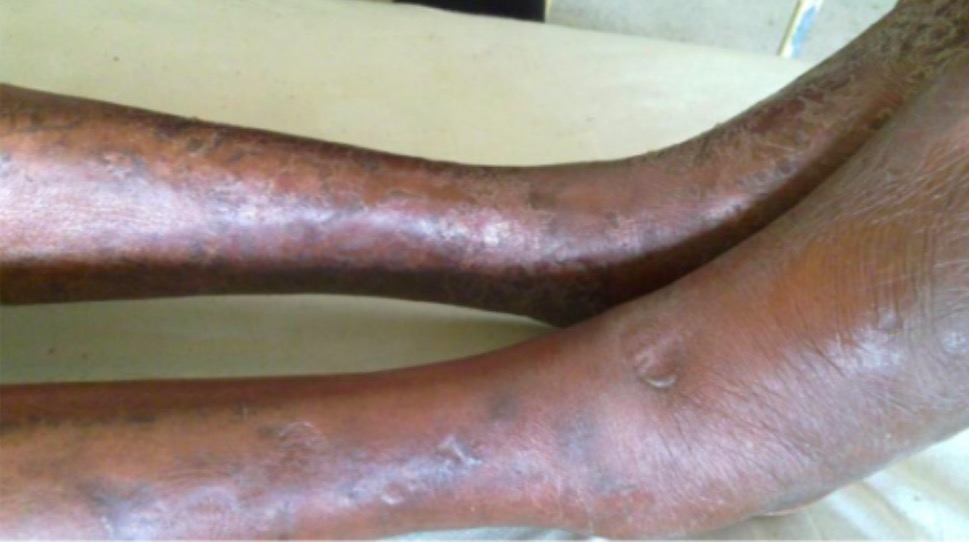Playlist
Show Playlist
Hide Playlist
Acquired Thrombotic Syndromes
-
Slides ThromboticDisorders.pdf
-
Download Lecture Overview
00:01 Under acquired thrombotic syndromes, we'll take a look at antiphospholipid syndrome. 00:06 Highest association with SLE. 00:11 Also, you must think of it as being a connected tissue disease, so therefore, could be associated with rheumatoid arthritis in children. 00:19 So let's put all this together. 00:20 So this is an acquired type of autoimmune disease known as antiphospholipid syndrome. 00:25 So what's actually happening here is an autoimmune disease in which it is actually causing thrombi formation in a young lady. 00:33 You're gonna look for a lady that has recurrent thrombi on the venous side and the arterial side, and could also be suffering from or experiencing recurrent spontaneous abortions. 00:45 Other things about antiphospholipid syndrome, the SLE part, the lupus. 00:50 Interesting enough, what kind of situation is this? Thrombotic situation. Right? In other words, procoagulation, amazingly. 01:03 You take a cell from such a patient and you put it into a test tube in vitro. 01:10 You know what that cell does to the blood in vitro? Anticoagulate. 01:17 Why? Fascinating, I don't know. 01:20 But it does. 01:21 Hence commonly or was called Lupus anticoagulant. 01:27 Be careful though, because my patient is actually suffering from procoagulation. 01:35 Hence, recurrent DVTs, hence the recurrent spontaneous abortions. 01:43 For some reason, you take the cell out from in vivo and put it in vitro it causes anticoagulation. 01:52 Keep that in mind, let's talk a little bit more. 01:55 We have something else called anticardiolipin antibody. 01:59 What is fascinating about this is the following. 02:02 Here's once again a young lady. 02:04 She's faithful to her husband, boyfriend, what have you, to her partner, but yet, she comes back to be found positive for RPR, don't judge. 02:17 Here's a test for syphilis but she's never been promiscuous and she's been careful. 02:24 So in antiphospholipid syndrome, anticardiolipin, the antibody for some reason, the RPR will then test positive for syphilis, but false positive though is my point. 02:40 Fascinating antibody. 02:42 Here it is. 02:45 Lupus anticoagulant, do you see the significance? What's going on with my patient again? Oh, procoagulant. 02:51 You take the cell and put it into a test tube in vitro, what happens to the blood? Oh, anticoagulant, but my patient is not bleeding. 02:59 My patient is thrombotic and you must know anti-beta2-glycoprotein 1 antibody is the specific antibody that you wanna keep in mind. 03:10 There are others that have been identified but here's one that commonly shows up. 03:15 Clinically, your presentation repeated spontaneous abortions. 03:20 Why? Because of all that thrombi formation causing ischemia to the placenta. 03:24 Strokes, thrombi formation, DVT and hepatic vein thrombus up and down the body, huh? Thrombi formation taking place, autoimmune, young lady, unfortunate.
About the Lecture
The lecture Acquired Thrombotic Syndromes by Carlo Raj, MD is from the course Hemostasis: Basic Principles with Carlo Raj.
Included Quiz Questions
Antiphospholipid syndrome is most commonly associated with which of the following conditions?
- Systemic lupus erythematosus
- Behcet's disease
- Sjogren’s syndrome
- Human immunodeficiency virus
- Rheumatoid arthritis
Which of the following antibodies is most likely to cause a false-positive test for syphilis?
- Anticardiolipin antibodies
- Lupus anticoagulant
- Anti-beta-2 glycoprotein-1 antibody
- Antinuclear antibody
- Anti-double stranded DNA
Customer reviews
5,0 of 5 stars
| 5 Stars |
|
5 |
| 4 Stars |
|
0 |
| 3 Stars |
|
0 |
| 2 Stars |
|
0 |
| 1 Star |
|
0 |




